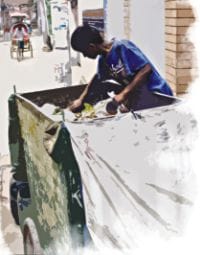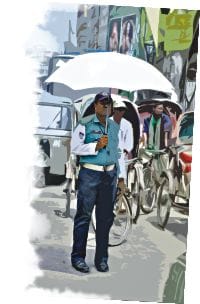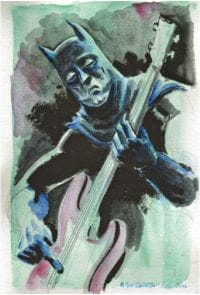Who holds the reins?
Story: Safieh Kabir
Photos: Rovan Shams
“Power resides where men believe it resides.” - A Clash of Kings by George R. R. Martin
They do not have overflowing Swiss bank accounts or gun-wielding gangs of loyalists. Their faces are ordinary, their clothes faded and their oratory skills insignificant. Ask them, and they will tell you of their meaningless jobs, of futile perspiration. Few will think that their lives make a difference at all.
But we, at RS, ask you to suppose. We choose three groups of people from this great mass of the small, and imagine the consequences if they disappeared. And then we contemplate power.
......................................................................................................................................................
 The newspaper boy
The newspaper boy
He follows the sun onto the streets in the morning, out with his pile of information before you've even left your bed. His pay is measly whether he is the one who drops the paper by your house, or the little hawker on the street. He probably does not read anything he sells. Quite possibly he cannot.
But what if he becomes angry? What if, every morning, when he is handed his pile of newspapers, he takes out a box of matches and sets it aflame? What if every newspaper boy does the same? The newspapers stop coming. The knowledge upon which thousands of individuals base their decisions is cut off at the source. Men and women around the country become uninformed and ignorant. A form of intellectual advancement becomes impossible and the stock market does more blazing cartwheels then usual.
These little boys, on impulse, have thrown much of the country into the dark.
......................................................................................................................................................
The sweeper
 We are thinking of the woman rather than the man, with the jacket over her saree, walking with bent back and broom by the pavement. She and her companions sweep the litter of yesterday into little piles that will reappear tomorrow, and the next day, and the next. Those who have not seen her wouldn't even believe she exists, because the rubbish never leaves. She has no mask or acknowledgement, and few prospects for the future.
We are thinking of the woman rather than the man, with the jacket over her saree, walking with bent back and broom by the pavement. She and her companions sweep the litter of yesterday into little piles that will reappear tomorrow, and the next day, and the next. Those who have not seen her wouldn't even believe she exists, because the rubbish never leaves. She has no mask or acknowledgement, and few prospects for the future.
But suppose they all give up. They shed their dirty gloves and drop their filthy brooms, and they take to begging instead. No one else will take their places. There are no more piles of litter to be carried away in the mornings; it is a flood on the streets. Crackling chips packets and the ends of cigarettes, empty juice cartons, used tissues; they rustle around your ankles as you walk and are blown into your face by the wind. Old food decays. The crows turn the air black. Tourists will not come, and the citizens themselves cannot abide the streets.
The invisible people have laid waste to the cities.
Money can be made, people can be bought, and knowledge can be gained. It is we who decide whether we have power.
.......................................................................................................................................................
The traffic sergeant
 He stands at the crossroads in his uniform of belted, pasty green, with his boots of black and his angry mouth. There are traffic signals surrounding him, flashing by turns red, green and yellow, but he pays them little mind. The cars move twice every hour or so, and his back pocket is swollen with bribes.
He stands at the crossroads in his uniform of belted, pasty green, with his boots of black and his angry mouth. There are traffic signals surrounding him, flashing by turns red, green and yellow, but he pays them little mind. The cars move twice every hour or so, and his back pocket is swollen with bribes.
But imagine if for one week, he and every other traffic sergeant in the country decide not to come to work. Their posts amidst the pollution are empty, their omnipotent batons are shelved, and the men themselves are sleeping. Suddenly, the Bangladeshi driver finds himself free. There is no one to tell him to stop except a light on a metal stick, and he cares no more about this light than he has ever done. Every car on every road attempts to move at the same time, all the time. And everything stops. No one can go forward, no one can reverse. There is a vehicle just behind every other vehicle, facing a different direction. Students and bankers, thugs and politicians, food, soap and bricks - they all sit stationary in a traffic jam that spans the nation.
These men do not have a place in Parliament, or even a proper education, but they have brought the country to a halt.
The Heart of Music
By The Kopite
What's the difference between a bass player and a mutual fund?
The mutual fund will mature and make money.
 We've all rocked out on our air guitars at least a million times and looked absolutely ridiculous doing it (don't deny it. We have eyes everywhere). We've pretended to move our fingers at the speed of light while mimicking Petrucci on one of his legendary solos. Hell, at one time or the other we've all thought of jumping on stage with a mike, a guitar, the drums or even a keyboard to dazzle everyone with our supposed 'musical genius'. It's safe to say that in our rockstar dreams not many of us think of rocking it on the bass.
We've all rocked out on our air guitars at least a million times and looked absolutely ridiculous doing it (don't deny it. We have eyes everywhere). We've pretended to move our fingers at the speed of light while mimicking Petrucci on one of his legendary solos. Hell, at one time or the other we've all thought of jumping on stage with a mike, a guitar, the drums or even a keyboard to dazzle everyone with our supposed 'musical genius'. It's safe to say that in our rockstar dreams not many of us think of rocking it on the bass.
Bassists are universally underrated. It extends to the point that unless you are The Flea or John Entwistle's ghost, you don't deserve to be spoken of in the same breath as your other band members. The age old adage 'nice guys finish last' holds true for these musicians (strictly speaking in musical terms here. They might possibly be huge jerks and/or moonlight as serial killers).
The main reason behind this is that a bass instrument is not easy to discern amidst the cacophony of other instruments. But then again, try turning down the bass on your speakers or headphones and the difference will be striking. The music turns flat or shallow without it. The bass is the driving force that gives the music substance and depth.
There are several myths surrounding this, too. People say playing a bass is the easiest thing there is. One of the reasons behind me writing this is a friend of mine remarked that bassists are 'failed guitarist' who couldn't quite cut it with the ax. It'll be a long time before he dares to make another comment like that. Imagine if Roger Waters heard this. You can't simply say that to the mastermind behind Dark Side of the Moon. Bassists are tasked with the unenviable job of keeping the rhythm at all times and doing the grunt work to make sure all the other elements are in-sync. Even without standing out, a good beat is needed to lock in with the drums and make an awesome song. Hence, only the best of the best dare to venture out and perform solos (case in point: Bassbaba Sumon).
This proves that, if anything, bassists are required to have the greater knowledge of music and their work may not be flashy but it is crucial. If you lot are still not convinced, I recommend some jazz and reggae for you. Pick out the brilliance of Aston “Family Man” Barett behind every Marley song and you'll agree with me. So, no. Playing bass is not easy. What with the low job-satisfaction and gratification that goes with it, it's probably the toughest one to master.
So remember, if you're a bassist and people say that you're the Alfred of the story, laugh at them and say that they're wrong. You are Batman. You clean up the streets so that your band mates can have a ball - they are the citizens. And, at the end of the day, you don't get the credit either. The hero the people need, not the one they deserve (okay, maybe I'm taking things too far here). Point is, next time you are rocking out to a Dream Theatre song, spare a thought for John Myung, too.
